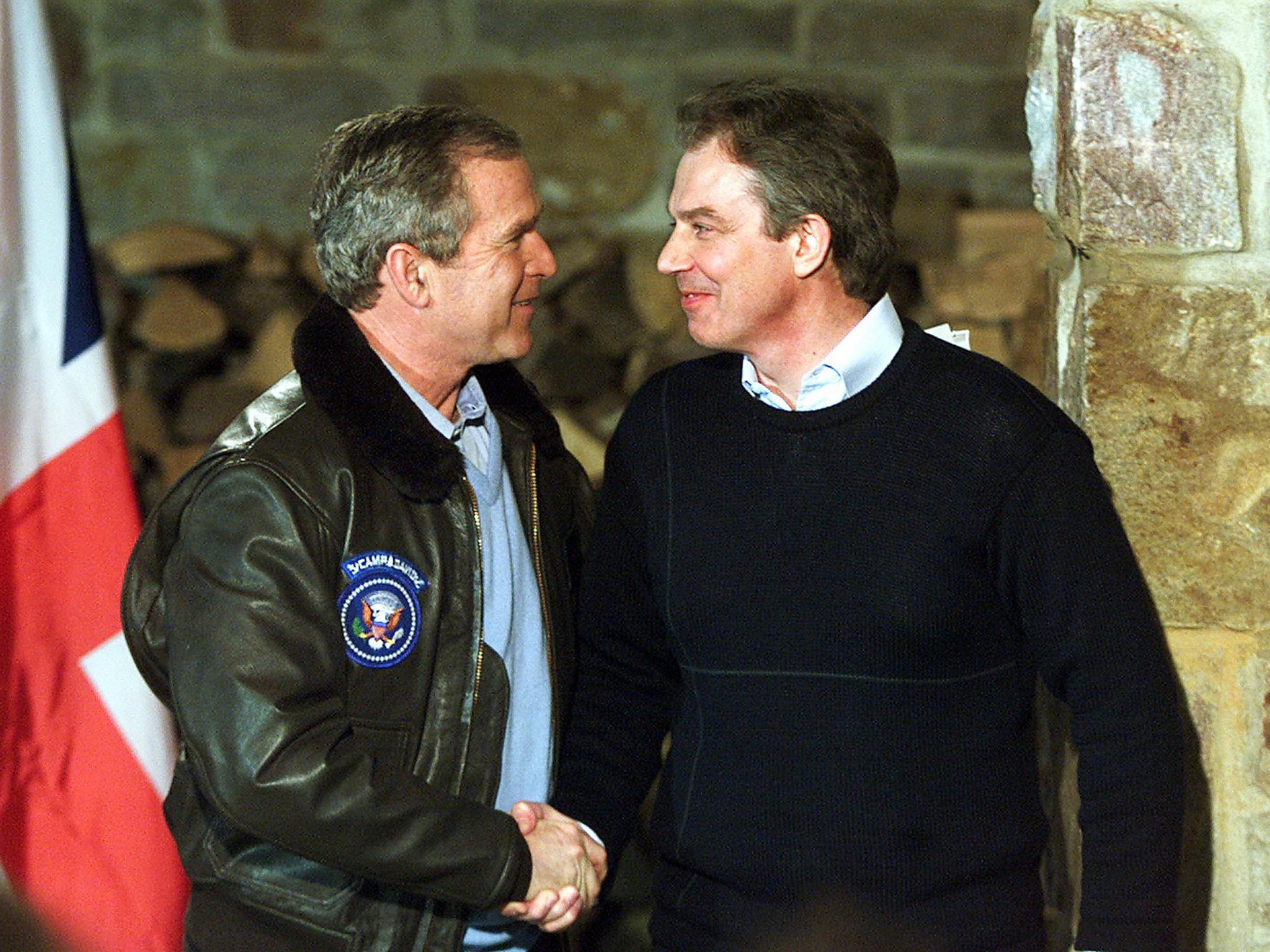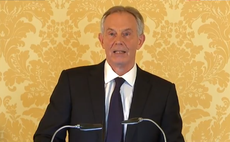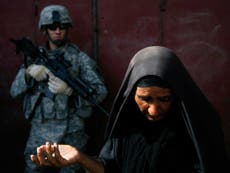What would have happened if Tony Blair hadn't taken us to the Iraq War?
There are three possible scenarios that could have played out...


Much of the commentary about the Chilcot report and Tony Blair’s decision to go join the US-led invasion is based on a series of might-have-beens. But do they really justify the blanket certainty with which Blair’s actions have been condemned? Would the sum of human suffering really have been less, had he acted differently?
Blair’s critics, such as Robin Cook at the time, have claimed that by 2003 Saddam had been “caged”, hemmed in by weapons inspections, UN sanctions, a no-fly zone and intense surveillance. In that view, had there been no invasion of Iraq then the situation would simply have persisted until Saddam was either overthrown by his own people, presumably in some sort of Arab Spring, or otherwise removed from power. In any case, there was no chance of him using weapons of mass destruction, if he had any, and if he had then he could have been swiftly dealt with in an atmosphere of international consensus, with the UN unequivocally behind a legal war.
In Blair’s parallel world, such weakness would merely have postponed the inevitable, and would actually have made the ultimate struggle worse. That is because the extra time given to Saddam would simply have been used by him to develop his WMDs, along with the means to deploy them further and further afield, probably though links with other “axis of evil” powers such as North Korea. When the West finally did wake up to the threat and managed to agree on UN-backed, legal action, it would have been almost too late. Israel, Kuwait and Iran would have been faced with a neighbour armed with nuclear and chemical weapons, and keen to use them, and the West would either have been powerless in the face of that deterrent or would have had to sustain far worse casualties to have won a war against his enhanced armoury. And all the while, of course, Saddam would have been busy torturing and killing his own people, as he always did.
Once you start considering such possibilities, it becomes clear that, even with hindsight, we cannot say with certainty that things would have been better had Blair been persuaded to change his mind. Consider, for example, the following three alternative scenarios. Each suggests a different way in which things might have turned out differently – and there would, of course, have been countless possible sub-variations within each of these. Can we really be certain that Blair took the worst possible choice?
Scenario 1: No invasion (best case)
When a combination of pressure from Congress, the United Nations, Tony Blair and some other Nato allies finally persuaded President Bush that he really did need the explicit approval of the UN Security Council in a second resolution to go to war, it seemed unbelievable. His many detractors mocked the one-time eagle turned dove, and there were many conspiracy theories about whether the US military had in fact warned Bush that, even if he won the war, the chances were that he would have to rule Iraq as a virtual – and very unruly – colony and he would be sucked into a second Vietnam. The rumour was that the Pentagon told the President that they couldn’t plan for a post-conflict Iraq because it would be such a mess. Others conjectured that the Bush family’s links with Saudi Arabia played some role in the change of policy, though the Saudis, like the Kuwaitis, were no friends of Saddam.
In any case, war was averted. The UN continued to apply sanctions, which proved less effective than many had hoped. Saddam's regime deftly evaded them and abused the various exemptions for food, medicines and humanitarian assistance, while the dramatic rise in the oil price over the next few years kept the regime more than solvent. None of that prevented a lone Marsh Arab – with rumoured CIA help – conducting an assassination attempt that left Saddam crippled and unable to rule. His two sons formed an uneasy partnership to take over from him.
Their policies veered from friendly overtures to the West through to acts of mild aggression towards neighbouring Iran and Kuwait, such as flying over their sovereign airspace. They continued to cultivate their links with that other dynastic pariah regime North Korea, in an attempt to modernise their weapons of mass destruction and give them the capacity to hit Israel and Europe. However, repeated high profile tests, blatantly flaunting UN resolutions, were merely spectacular flops. President McCain – narrowly elected on a “no war on Iraq” ticket in 2008 – and Secretary of State Sarah Palin claimed that Saddam was “caged” and that if he behaved aggressively towards his neighbours he would be “punished”. As of 2016, Saddam’s boys were still operating their reign of terror, but were regarded more as buffoons than a serious military threat.
Scenario 2: The US invades alone
The series of Cabinet resignations that followed that of Robin Cook – in a highly orchestrated series of one per hour – so destabilised Tony Blair’s administration that he was forced to stand down military operations against Iraq, but the US invasion went ahead anyway. “That’s too bad” was George Bush’s dismissive comment as he came off the golf course when reporters put the news of the change in British policy to him. “We thought they’d be with us whatever”. Defence Secretary Rumsfeld was no less blunt: “One known known is that we didn’t need ’em.” President Bush’s war on Iraq was internationally condemned, and turned Iraq into a quagmire after Saddam’s army and the civil service were dismantled in a process called “de-Ba’athification”.
In Britain, Blair was openly congratulated by prominent back bench critics such as Jeremy Corbyn, much to the embarrassment of the prime minister, who survived and restructured his cabinet with jobs for Corbyn, for Ken Livingstone and a promotion to Chancellor for Robin Cook. Blair's enhanced popularity made him the longest serving leader in history when he celebrated his 21st anniversary as party leader in 2015, shortly before his retirement to became President of Europe. He was succeeded by Clare Short.
Scenario 3: No invasion (worst case)
The collapse of President Bush’s foreign policy after renewed allegations about family corruption and about the “stolen” election of 2000, exacerbated by extreme international opposition, left Saddam in place. Just as Bush and Blair had warned, Saddam took the failure to enforce UN resolution 1441 and others as a sign of weakness, and he began a long escalation of his murderous regime. Internal enemies – “spies” – were the first to be rounded up; then came the genocidal attacks on the Kurds. Again the West stood by. An attack on Iran, entirely predicted, was also all-but ignored by Bush and Blair, with Blair remarking, when he thought he was off-mike, that “it’s a pity that they can’t both lose their war”.
By the time Saddam managed to launch a missile attack on Israel it was too late to do anything about his now proven stocks of chemical and nuclear weapons, developed under the noses of UN Weapons Inspectors with the suspected help of the North Koreans. As the world prepared for what threatened to become a world war, this historic failure of British and US foreign policy resulted in the near simultaneous resignations of Blair and Bush in 2008. President Cheney condemned his old boss for “failing to act” against the tyrant. In the House of Commons, Blair's personal statement of resignation was met with jeers by backbencher Jeremy Corbyn who condemned Blair’s “cowardly failure to protect Iraq’s people against a monster who was a clear and present danger to his neighbours in the region and indeed the British people – a stain on our party’s reputation and virtually a crime against humanity”.



Join our commenting forum
Join thought-provoking conversations, follow other Independent readers and see their replies